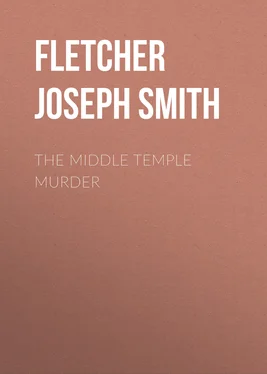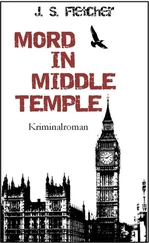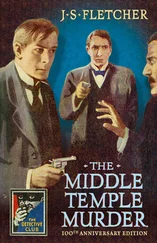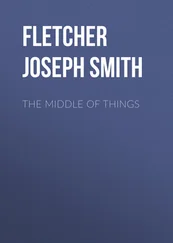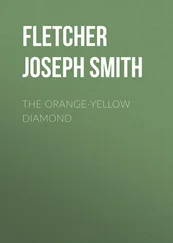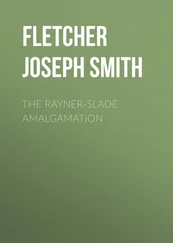Joseph Fletcher - The Middle Temple Murder
Здесь есть возможность читать онлайн «Joseph Fletcher - The Middle Temple Murder» — ознакомительный отрывок электронной книги совершенно бесплатно, а после прочтения отрывка купить полную версию. В некоторых случаях можно слушать аудио, скачать через торрент в формате fb2 и присутствует краткое содержание. Жанр: foreign_prose, Классический детектив, foreign_detective, foreign_antique, на английском языке. Описание произведения, (предисловие) а так же отзывы посетителей доступны на портале библиотеки ЛибКат.
- Название:The Middle Temple Murder
- Автор:
- Жанр:
- Год:неизвестен
- ISBN:нет данных
- Рейтинг книги:5 / 5. Голосов: 1
-
Избранное:Добавить в избранное
- Отзывы:
-
Ваша оценка:
- 100
- 1
- 2
- 3
- 4
- 5
The Middle Temple Murder: краткое содержание, описание и аннотация
Предлагаем к чтению аннотацию, описание, краткое содержание или предисловие (зависит от того, что написал сам автор книги «The Middle Temple Murder»). Если вы не нашли необходимую информацию о книге — напишите в комментариях, мы постараемся отыскать её.
The Middle Temple Murder — читать онлайн ознакомительный отрывок
Ниже представлен текст книги, разбитый по страницам. Система сохранения места последней прочитанной страницы, позволяет с удобством читать онлайн бесплатно книгу «The Middle Temple Murder», без необходимости каждый раз заново искать на чём Вы остановились. Поставьте закладку, и сможете в любой момент перейти на страницу, на которой закончили чтение.
Интервал:
Закладка:
"Just so—just so!" said Rathbury. "So you would, ma'am—so you would. Well, something has happened to him. He's dead. What's more, there's strong reason to think he was murdered."
Mr. and Mrs. Walters received this announcement with proper surprise and horror, and the landlord suggested a little refreshment to his visitors. Spargo and Breton declined, on the ground that they had work to do during the afternoon; Rathbury accepted it, evidently as a matter of course.
"My respects," he said, lifting his glass. "Well, now, perhaps you'll just tell me what you know of this man? I may as well tell you, Mr. and Mrs. Walters, that he was found dead in Middle Temple Lane this morning, at a quarter to three; that there wasn't anything on him but his clothes and a scrap of paper which bore this gentleman's name and address; that this gentleman knows nothing whatever of him, and that I traced him here because he bought a cap at a West End hatter's yesterday, and had it sent to your hotel."
"Yes," said Mrs. Walters quickly, "that's so. And he went out in that cap last night. Well—we don't know much about him. As I said, he came in here about a quarter past twelve yesterday morning, and booked Number 20. He had a porter with him that brought a trunk and a bag—they're in 20 now, of course. He told me that he had stayed at this house over twenty years ago, on his way to Australia—that, of course, was long before we took it. And he signed his name in the book as John Marbury."
"We'll look at that, if you please," said Rathbury.
Walters fetched in the register and turned the leaf to the previous day's entries. They all bent over the dead man's writing.
"'John Marbury, Coolumbidgee, New South Wales,'" said Rathbury. "Ah—now I was wondering if that writing would be the same as that on the scrap of paper, Mr. Breton. But, you see, it isn't—it's quite different."
"Quite different," said Breton. He, too, was regarding the handwriting with great interest. And Rathbury noticed his keen inspection of it, and asked another question.
"Ever seen that writing before?" he suggested.
"Never," answered Breton. "And yet—there's something very familiar about it."
"Then the probability is that you have seen it before," remarked Rathbury. "Well—now we'll hear a little more about Marbury's doings here. Just tell me all you know, Mr. and Mrs. Walters."
"My wife knows most," said Walters. "I scarcely saw the man—I don't remember speaking with him."
"No," said Mrs. Walters. "You didn't—you weren't much in his way. Well," she continued, "I showed him up to his room. He talked a bit—said he'd just landed at Southampton from Melbourne."
"Did he mention his ship?" asked Rathbury. "But if he didn't, it doesn't matter, for we can find out."
"I believe the name's on his things," answered the landlady. "There are some labels of that sort. Well, he asked for a chop to be cooked for him at once, as he was going out. He had his chop, and he went out at exactly one o'clock, saying to me that he expected he'd get lost, as he didn't know London well at any time, and shouldn't know it at all now. He went outside there—I saw him—looked about him and walked off towards Blackfriars way. During the afternoon the cap you spoke of came for him—from Fiskie's. So, of course, I judged he'd been Piccadilly way. But he himself never came in until ten o'clock. And then he brought a gentleman with him."
"Aye?" said Rathbury. "A gentleman, now? Did you see him?"
"Just," replied the landlady. "They went straight up to 20, and I just caught a mere glimpse of the gentleman as they turned up the stairs. A tall, well-built gentleman, with a grey beard, very well dressed as far as I could see, with a top hat and a white silk muffler round his throat, and carrying an umbrella."
"And they went to Marbury's room?" said Rathbury. "What then?"
"Well, then, Mr. Marbury rang for some whiskey and soda," continued Mrs. Walters. "He was particular to have a decanter of whiskey: that, and a syphon of soda were taken up there. I heard nothing more until nearly midnight; then the hall-porter told me that the gentleman in 20 had gone out, and had asked him if there was a night-porter—as, of course, there is. He went out at half-past eleven."
"And the other gentleman?" asked Rathbury.
"The other gentleman," answered the landlady, "went out with him. The hall-porter said they turned towards the station. And that was the last anybody in this house saw of Mr. Marbury. He certainly never came back."
"That," observed Rathbury with a quiet smile, "that is quite certain, ma'am? Well—I suppose we'd better see this Number 20 room, and have a look at what he left there."
"Everything," said Mrs. Walters, "is just as he left it. Nothing's been touched."
It seemed to two of the visitors that there was little to touch. On the dressing-table lay a few ordinary articles of toilet—none of them of any quality or value: the dead man had evidently been satisfied with the plain necessities of life. An overcoat hung from a peg: Rathbury, without ceremony, went through its pockets; just as unceremoniously he proceeded to examine trunk and bag, and finding both unlocked, he laid out on the bed every article they contained and examined each separately and carefully. And he found nothing whereby he could gather any clue to the dead owner's identity.
"There you are!" he said, making an end of his task. "You see, it's just the same with these things as with the clothes he had on him. There are no papers—there's nothing to tell who he was, what he was after, where he'd come from—though that we may find out in other ways. But it's not often that a man travels without some clue to his identity. Beyond the fact that some of this linen was, you see, bought in Melbourne, we know nothing of him. Yet he must have had papers and money on him. Did you see anything of his money, now, ma'am?" he asked, suddenly turning to Mrs. Walters. "Did he pull out his purse in your presence, now?"
"Yes," answered the landlady, with promptitude. "He came into the bar for a drink after he'd been up to his room. He pulled out a handful of gold when he paid for it—a whole handful. There must have been some thirty to forty sovereigns and half-sovereigns."
"And he hadn't a penny piece on him—when found," muttered Rathbury.
"I noticed another thing, too," remarked the landlady. "He was wearing a very fine gold watch and chain, and had a splendid ring on his left hand—little finger—gold, with a big diamond in it."
"Yes," said the detective, thoughtfully, "I noticed that he'd worn a ring, and that it had been a bit tight for him. Well—now there's only one thing to ask about. Did your chambermaid notice if he left any torn paper around—tore any letters up, or anything like that?"
But the chambermaid, produced, had not noticed anything of the sort; on the contrary, the gentleman of Number 20 had left his room very tidy indeed. So Rathbury intimated that he had no more to ask, and nothing further to say, just then, and he bade the landlord and landlady of the Anglo-Orient Hotel good morning, and went away, followed by the two young men.
"What next?" asked Spargo, as they gained the street.
"The next thing," answered Rathbury, "is to find the man with whom Marbury left this hotel last night."
"And how's that to be done?" asked Spargo.
"At present," replied Rathbury, "I don't know."
And with a careless nod, he walked off, apparently desirous of being alone.
CHAPTER FIVE
The barrister and the journalist, left thus unceremoniously on a crowded pavement, looked at each other. Breton laughed.
"We don't seem to have gained much information," he remarked. "I'm about as wise as ever."
Читать дальшеИнтервал:
Закладка:
Похожие книги на «The Middle Temple Murder»
Представляем Вашему вниманию похожие книги на «The Middle Temple Murder» списком для выбора. Мы отобрали схожую по названию и смыслу литературу в надежде предоставить читателям больше вариантов отыскать новые, интересные, ещё непрочитанные произведения.
Обсуждение, отзывы о книге «The Middle Temple Murder» и просто собственные мнения читателей. Оставьте ваши комментарии, напишите, что Вы думаете о произведении, его смысле или главных героях. Укажите что конкретно понравилось, а что нет, и почему Вы так считаете.
